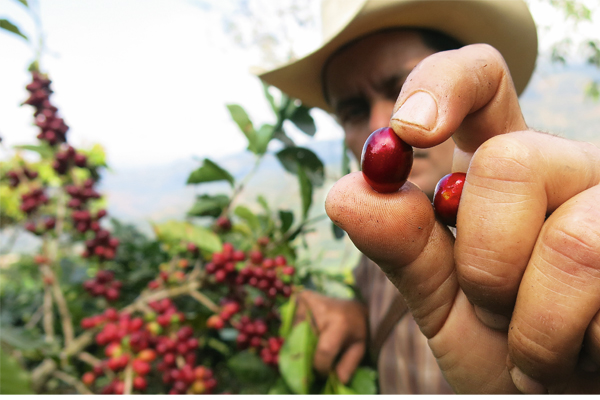ICO Coffee Market Report September: 2018/19 marks second consecutive year of surplus

As the end of the coffee year approaches, world coffee production in coffee year 2018/19 is estimated to be 3.7% higher than in the previous year at 168.87 million bags, as output of Arabica increased by 1.8% to 102.68 million bags and Robusta grew 6.7% to 66.04 million bags.
The ICO composite indicator rose to 97.74 US cents/lb in September 2019, increasing 1.7% from August 2019. Brazilian Naturals saw the largest increase, climbing 3% over the month to an average of 98.73 US cents/lb. Colombian Milds and Other Milds increased by 2.1% to 131.90 US cents/lb and 128.89 US cents/lb, respectively. The group indicator for Robustas, on the other hand, dropped to its lowest monthly average since April 2010, falling 0.2% to 70.64 US cents/lb in September 2019. A consecutive two-year increase in Robusta production, driven primarily by Brazil and Vietnam, has contributed to the decline. Coffee prices have averaged 100.47 US cents/lb in coffee year 2018/19 so far.
Arbitrage between Arabica and Robusta coffees, as measured on the New York and London futures markets, increased by 9.1% to 42.50 US cents/lb, pushed both by a 2.9% increase in the New York futures market and a 1% decline in the London market. The decline drove the London futures market to its lowest level since March 2010, mirroring the fall in Robusta indicator prices.
Production increase driven by Robusta growth
World production in coffee year 2018/19 is estimated to be 3.7% higher at 168.87 million bags, which includes part of the new crop for producing countries with crop years commencing in April and July. Production of both Arabica and Robusta increased in 2018/19, though the majority of the increase came from Robusta, which grew 6.7% to 66.04 million bags compared to coffee year 2017/18. Arabica production increased by 1.8% to 102.68 million bags. Output rose in all regions except for Mexico & Central America, where the harvest declined by 0.8% to 21.47 million bags. Nearly half of the world’s coffee was produced in South America, where production is estimated 4.8% higher at 80.95 million bags in coffee year 2018/19. Production grew by 4.6% in Asia & Oceania to 48.46 million bags, while output in Africa rose by 1.9% to 17.99 million bags.
2018/19 shipments have already surpassed those of 2017/18
The larger supply in coffee year 2018/19 is reflected in increased shipments. In the first eleven months of coffee year 2018/19, world coffee exports were 9.2% higher than in the same period for coffee year 2017/18, amounting to 120.28 million bags, already surpassing the total volume shipped in coffee year 2017/18.
Shipments of Colombian Milds rose by 8.6% to 13.88 million bags, while Brazilian Naturals grew by 25.4% to 38.57 million bags. Colombia’s shipments rose by 7.8% to 12.53 million bags in October 2018 to August 2019. Tanzania and Kenya also shipped more coffee during this period, with their exports rising by 47.4% to 1.04 million bags and by 11% to 743,203 bags, respectively. Brazil saw an increase of 31.1% to 38.72 million bags, however, shipments from Ethiopia decreased by 4.8% to 3.23 million bags.
Exports of Other Milds fell by 4.1% to 24.99 million bags in October 2018 to August 2019. Shipments decreased in six of the ten largest members of this group during this period. Exports from Honduras fell by 5.1% to 6.57 million bags, from Peru by 7.3% to 3.14 million bags and from Mexico by 11.7% to 2.53 million bags. However, Guatemala’s shipments during this period rose by 5% to 3.34 million bags, and exports from Nicaragua rose by 13.2% to 2.64 million bags.
Robusta shipments increased by 5.6% to 42.84 million bags in the first eleven months of coffee year 2018/19. Vietnam is the world’s largest exporter of Robusta coffee and its total shipments increased by 3.9% to 24.97 million bags. However, India’s exports declined by 5.6% to 5.62 million bags, and Indonesia’s exports decreased by 9.8% to 4.82 million bags. Uganda’s exports remained stable, increasing by 0.6% to 4.09 million bags in October 2018 to August 2019. Côte d’Ivoire’s shipments grew by 49.1% to 1.62 million bags, offsetting the 8.4% decrease in exports from the Lao People’s Democratic Republic, amounting to 323,291 bags.
While shipments to date for the coffee year are higher, exports in August 2019 decreased by 4% to 10.45 million bags compared to August 2018. Arabica shipments decreased by 2.3% to 6.54 million bags, and Robusta by 6.6% to 3.9 million bags. The decrease in Arabica shipments was led by Other Milds, which fell by 15.3% to 1.99 million bags in August 2019, while exports of Brazilian Naturals remained stable at 3.27 million bags. Exports of Colombian Milds, however, rose by 18.3% to 1.29 million bags.
Global coffee consumption is estimated to have risen by 2.1% in coffee year 2018/19 at 164.82 million bags. Consumption in importing countries grew by 2.4% to 114.51 million bags while exporting countries’ consumption rose by 1.3% to 50.31 million bags, which represents 30.5% of world consumption.
Coffee production in 2018/19 exceeded global consumption by 4.05 million bags, which marks the second year of surplus. The total cumulative surplus is 5.48 million bags. This surplus has contributed to the low prices this coffee year, with the composite indicator averaging 100.47 US cents/lb for October 2018 to September 2019. In comparison, the average for the composite indicator in 2017/18 was 111.51 US cents/lb, and in 2016/17 was 132.43 US cents/lb. Additionally, exports in coffee year 2018/19 set a new record and put further pressure on prices.



